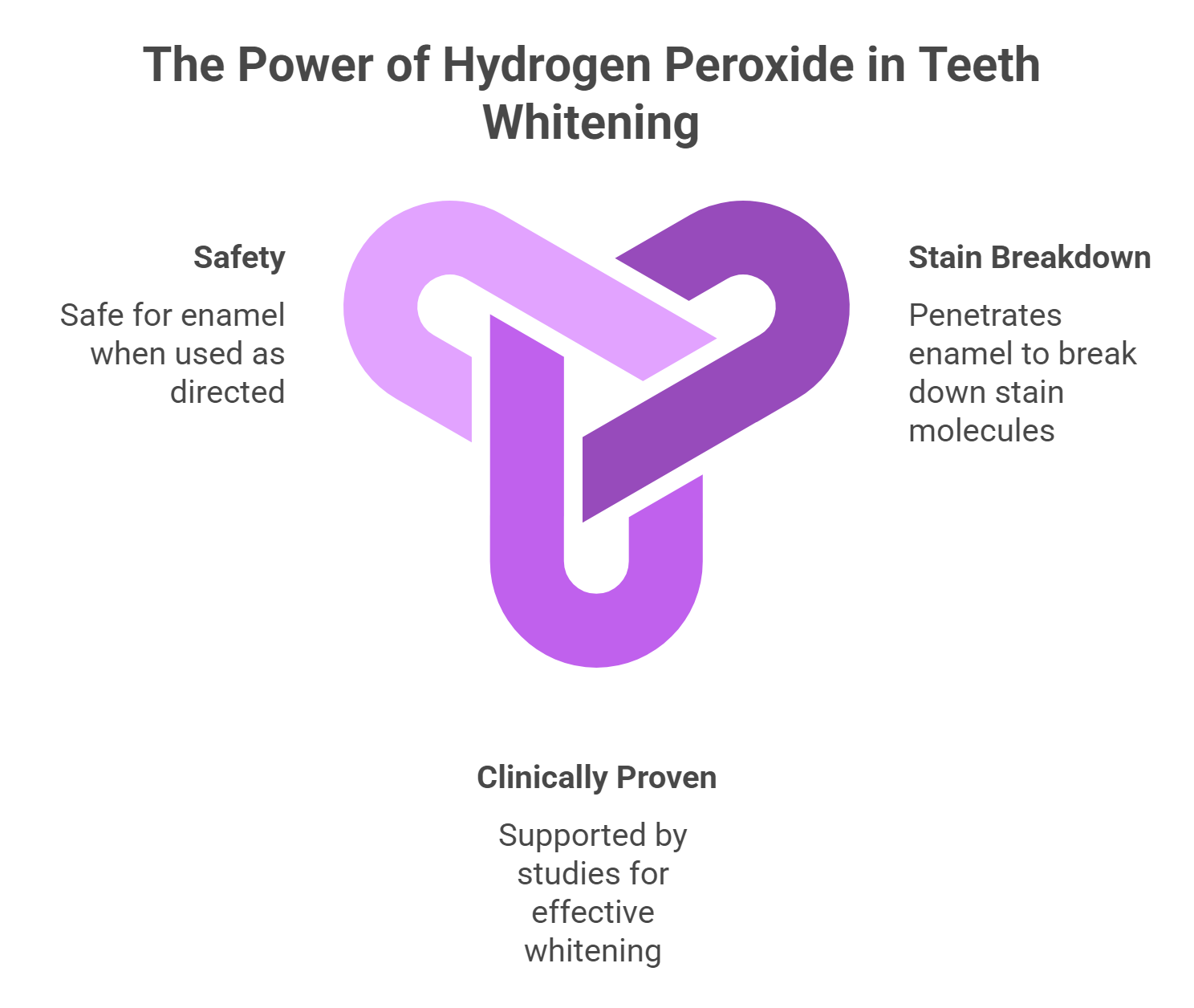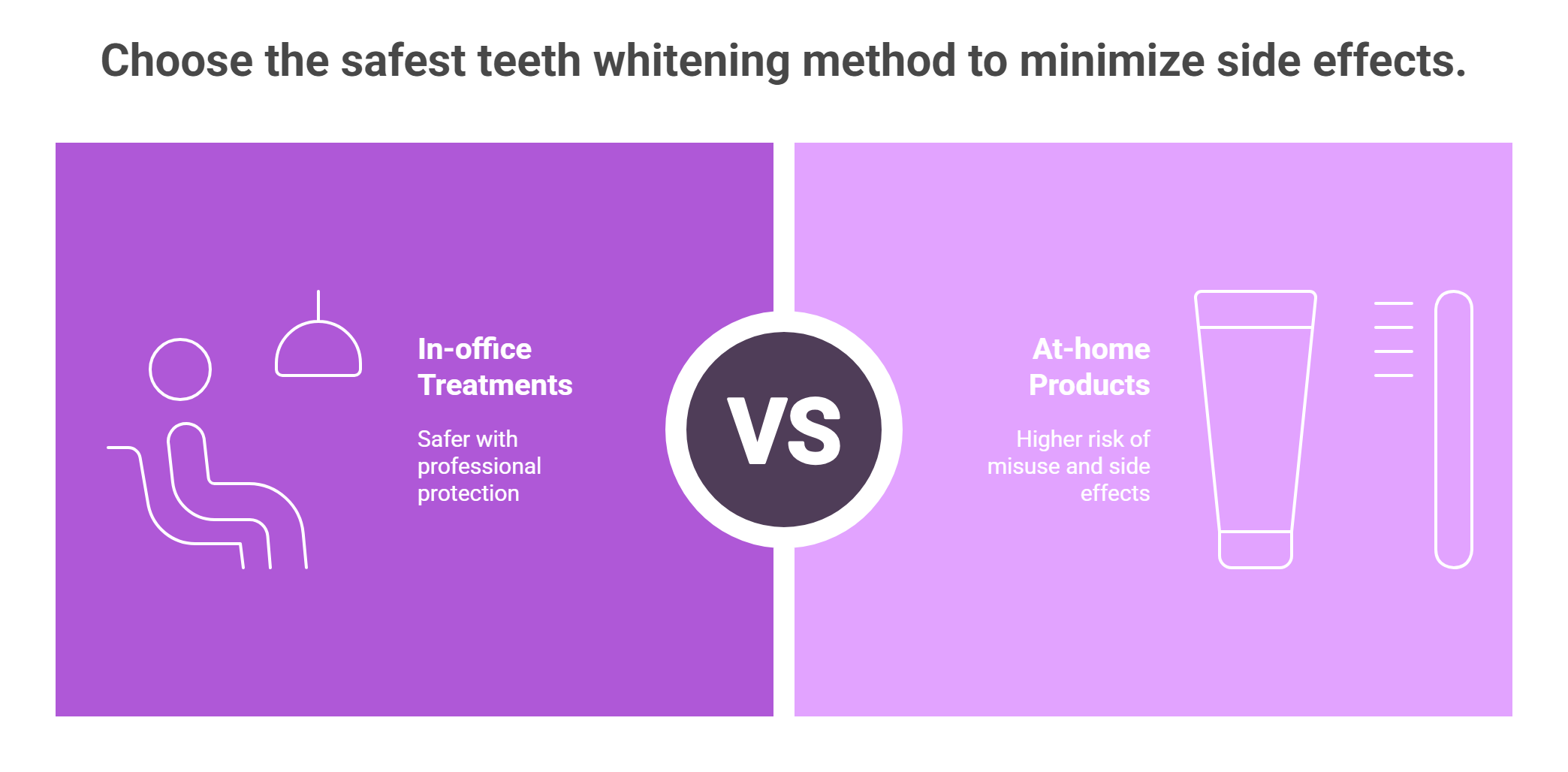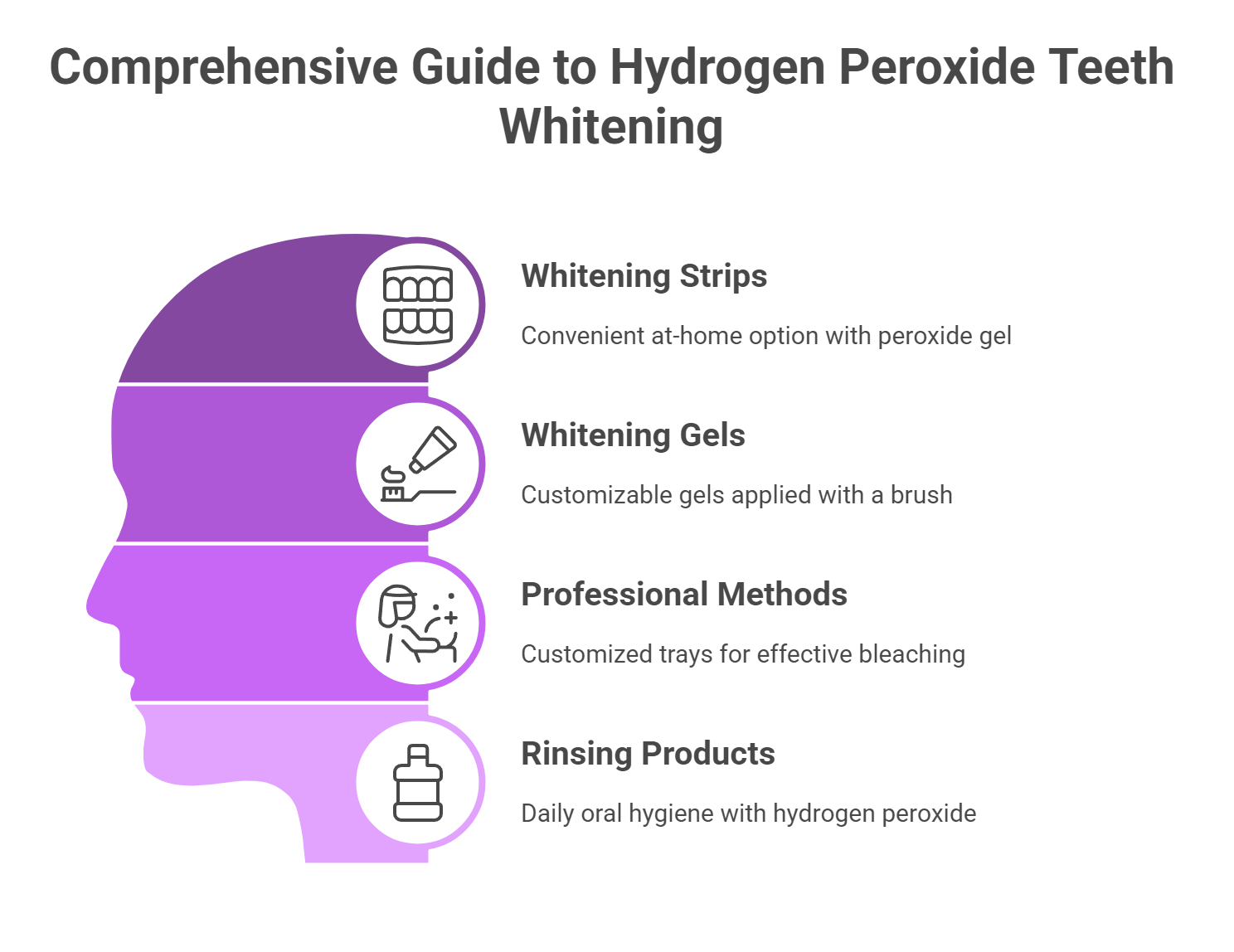Hydrogen peroxide is one of the most widely used ingredients in teeth whitening—found in everything from whitening strips to in-office treatments. It’s known for its ability to brighten smiles fast, but using it correctly is key to avoiding sensitivity or enamel damage.
So, is hydrogen peroxide safe for teeth? When used properly, yes—but there are important guidelines and precautions to follow.
In this article, we’ll walk you through the benefits, risks, and how to use hydrogen peroxide safely for a whiter, healthier smile.
Key Takeaways
-
Hydrogen peroxide effectively whitens teeth by penetrating enamel and breaking down discoloration compounds, making it a powerful agent in various whitening products.
-
While considered generally safe when used properly, it is essential to follow guidelines regarding concentration and usage frequency to avoid sensitivity and other dental issues.
-
Consulting a dental professional is advised before starting any whitening regimen to ensure safety, suitability, and to address any potential side effects.
How Hydrogen Peroxide Works for Teeth Whitening
Hydrogen peroxide is a powerful oxidizing agent widely used in teeth whitening treatments. What makes it effective is its ability to penetrate deep into the tooth and chemically break down the molecules that cause discoloration.
Here’s how it works:
-
It passes through the enamel and dentin layers of the tooth.
-
Once inside, it releases oxygen molecules that react with stain-causing compounds, such as chromogens.
-
These compounds are broken apart at the molecular level, making the tooth appear visibly whiter.
Unlike surface-level whiteners, hydrogen peroxide works below the enamel, targeting deeper, intrinsic stains. This is what sets it apart from non-bleaching alternatives like charcoal or whitening toothpaste, which mainly lift surface discoloration.
Whether found in at-home kits or professional in-office treatments, hydrogen peroxide remains one of the most effective solutions for long-lasting, comprehensive whitening results.
Benefits of Using Hydrogen Peroxide for Teeth Whitening

Hydrogen peroxide is widely used in whitening products for a reason—it works. Here are the key benefits that make it a reliable choice for restoring a brighter, healthier-looking smile:
-
Breaks down stains beneath the enamel: Hydrogen peroxide penetrates below the surface of your teeth to break down complex stain molecules, restoring your teeth’s natural whiteness.
-
Clinically proven whitening agent: Multiple studies confirm hydrogen peroxide as an effective ingredient for achieving visibly whiter teeth. Its oxidizing properties lift even stubborn discoloration quickly and efficiently.
-
Safe when used properly: Both hydrogen peroxide and carbamide peroxide are considered safe for tooth whitening when used as directed. No significant adverse effects on enamel have been reported, especially when using ADA-approved whitening products.
Whether you're using over-the-counter strips or professional treatments, hydrogen peroxide offers a science-backed, effective way to whiten your teeth.
Safe Usage Guidelines for Hydrogen Peroxide
While hydrogen peroxide is generally considered safe for teeth whitening, it’s crucial to follow specific guidelines to avoid any adverse effects.
The American Dental Association recommends a maximum concentration of 3.5% for safe use in teeth whitening products. Store bought hydrogen peroxide is typically available in low concentrations suitable for home use. Higher concentrations should only be used under professional supervision to mitigate potential risks.
For those preparing a hydrogen peroxide solution at home, consider the following guidelines regarding hydrogen peroxide concentrations:
-
Dilute it with equal parts water.
-
Use no more than a 3% concentration, as low concentrations are recommended for safety.
-
Always follow the manufacturer’s instructions regarding the frequency of use to avoid overuse.
Using high concentration hydrogen peroxide can increase the risk of side effects and should be avoided unless under professional supervision.
Overuse can lead to sensitivity and other dental issues.
Consulting with a dental professional before starting any whitening regimen is crucial. They can help you tailor the approach to your individual needs and check for any pre-existing oral health conditions that could affect the treatment. If you experience any side effects, such as increased sensitivity or gum irritation, it’s essential to consult your dentist immediately.
Potential Risks and Side Effects

While hydrogen peroxide is highly effective for whitening teeth, it’s not without potential side effects—especially when overused or applied incorrectly.
The most common side effects include tooth sensitivity and gum irritation, which often subside after stopping treatment. Gum irritation tends to occur more frequently with at-home kits, where application may be uneven or imprecise compared to professional treatments.
Some individuals may experience persistent sensitivity during or after whitening, particularly if they have pre-existing dental issues. High concentrations of hydrogen peroxide—especially in aggressive bleaching treatments—can increase the risk of enamel damage, surface roughness, and heightened sensitivity. These effects can become uncomfortable and may require professional attention.
The type of whitening method used also plays a role in side effect severity:
-
In-office treatments are typically safer, with built-in protections for your gums and enamel.
-
At-home products, when overused or misapplied, can cause enamel erosion or even leave behind uneven discoloration.
It’s also important to avoid whitening treatments altogether if you have active cavities, gum disease, or other oral health issues. A dentist can assess your condition and recommend safe whitening options based on your needs.
To minimize risks, always follow usage guidelines, choose ADA-approved products, and consult your dentist if you notice discomfort or side effects during treatment.
Maintaining Oral Health While Using Hydrogen Peroxide for Teeth Whitening
Hydrogen peroxide is a staple ingredient in many teeth whitening products due to its ability to effectively break down stains and brighten your smile. When used correctly, it can be a valuable part of your dental care routine.
However, maintaining good oral health while using hydrogen peroxide is essential. Overuse or improper application can lead to unwanted side effects like tooth sensitivity and gum irritation. These risks are especially common when products are used too frequently or at high concentrations without professional supervision.
To whiten teeth safely, consider following this step-by-step guide on how to use a teeth whitening pen:
-
Always follow the manufacturer’s instructions on hydrogen peroxide-based whitening products
-
Avoid daily or excessive use that could damage enamel or gums
-
Choose products with safe concentrations (typically no more than 3%)
In addition, routine dental hygiene plays a major role in keeping your smile healthy and bright. Brushing with fluoride toothpaste, flossing daily, and visiting your dentist regularly helps prevent tooth discoloration, plaque buildup, and gum issues.
By combining safe teeth whitening practices with consistent oral care, you can enjoy the benefits of hydrogen peroxide while protecting the long-term health of your teeth and gums.
Comparing Hydrogen Peroxide with Carbamide Peroxide
When it comes to teeth whitening agents, hydrogen peroxide and carbamide peroxide are the two most widely used ingredients. Both are effective, but they differ in how they work, how long they stay active, and how they impact sensitivity.
-
Hydrogen peroxide works faster and is often used in higher concentrations. It breaks down stains quickly and is typically found in in-office whitening treatments or short-duration at-home kits.
-
Carbamide peroxide breaks down more slowly, about one-third of it converts into hydrogen peroxide. This makes it gentler and ideal for overnight or extended-use applications.
While both deliver visible whitening results, studies show no significant difference in long-term color change when used on tooth-colored materials like resin composites. Choosing between the two comes down to your sensitivity level, desired speed of results, and lifestyle needs.
To help you decide which option may be best for you, here’s a quick side-by-side comparison:
|
Feature |
Hydrogen Peroxide |
Carbamide Peroxide |
|
Speed of Action |
Fast (short treatments) |
Slow (extended wear time) |
|
Common Use |
In-office, strips, short kits |
Night trays, gradual treatments |
|
Sensitivity Risk |
Higher |
Lower |
|
Concentration |
Higher (6–40%) |
Lower (usually 10–22%) |
|
Breaks Down Into |
Water + Oxygen |
Hydrogen Peroxide + Urea |
|
Best For |
Quick results |
Gentle whitening over time |
Types of Hydrogen Peroxide Teeth Whitening Products

Hydrogen peroxide is a versatile active ingredient found in various teeth whitening products. Whitening strips are a popular option for at-home use, featuring:
-
A thin layer of peroxide gel applied directly to the teeth
-
Typically about 30 minutes of application per session
-
A convenient way to whiten teeth at home
Whitening gels are another effective option, often requiring longer wear times than strips. These gels can be customized to fit individual needs and are directly applied to the teeth using a small brush. Professional teeth whitening methods usually come with customized trays that hold the bleaching gel against the teeth for a more effective application, helping to prevent staining. After removing whitening trays or gels, it is important to rinse your mouth thoroughly to remove any residual product and maintain oral hygiene.
Whitening solutions rinsing products are also available, offering an easy way to incorporate hydrogen peroxide into your daily oral hygiene routine. These products help combat tooth stains and maintain a bright smile over time.
Whitening Toothpastes and Mouthwashes
Whitening toothpastes and mouthwashes are popular over-the-counter products designed to help whiten teeth and remove everyday stains. These products often contain hydrogen peroxide or carbamide peroxide as the active ingredient, which works to break down surface stains and brighten your smile. The effectiveness of whitening toothpastes and mouthwashes can vary depending on the concentration of peroxide and the severity of tooth discoloration.
When choosing a whitening toothpaste or mouthwash, look for the ADA Seal of Acceptance to ensure the product meets safety and efficacy standards. Always follow the manufacturer’s instructions for best results and to avoid potential side effects. For individuals with more stubborn stains or significant tooth discoloration, dental professionals may recommend customized whitening treatments or in-office procedures that use higher concentrations of peroxide for more dramatic results.
DIY vs. Professional Teeth Whitening
When it comes to teeth whitening, you have the option of DIY methods or professional treatments. Professional whitening offers:
-
Higher concentrations of peroxide, resulting in more significant whitening effects in a shorter amount of time. These higher-concentration treatments are typically performed in a dentist's office for safety and effectiveness. In-office whitening treatments can involve hydrogen peroxide concentrations up to 40%.
-
Typical in office treatment whitening sessions that last 30 to 60 minutes.
-
Visible results after just one treatment.
DIY methods, such as over the counter products like OTC products, strips and gels, are:
-
More accessible and cost-effective
-
Often require a longer application period
-
May not provide the same level of results as professional treatments, including in office techniques
-
Associated with a higher risk of side effects like gum irritation and tooth sensitivity due to improper application
Many people also try common home remedies, such as using hydrogen peroxide, baking soda, or charcoal. However, these remedies often lack scientific support and may carry risks like enamel damage or increased sensitivity.
For those with sensitive teeth or pre-existing dental conditions, consulting a dental professional is always recommended. They can provide personalized advice and ensure that the whitening method chosen is safe and effective for your needs. Dental professionals can help guide you through this procedure.
Best Practices for Whitening Teeth Safely
Whitening your teeth with hydrogen peroxide can be both safe and effective—when done properly. To get the best results and avoid common pitfalls like sensitivity or enamel damage, follow these proven best practices:
-
Choose ADA-Accepted Products: Look for whitening products that carry the ADA Seal of Acceptance. These have been tested for safety and efficacy based on evidence-based dental practices, so you can feel confident using them.
-
Consult a Dental Professional First: Before starting any whitening regimen, check in with your dentist—especially if you have sensitive teeth, existing dental work, or gum issues. They can help customize a treatment plan and monitor for side effects.
-
Use Fluoride Toothpaste: Fluoride helps strengthen enamel and reduce the risk of irritation during or after whitening. This is especially helpful if you’re prone to tooth sensitivity.
-
Maintain Strong Oral Hygiene: Brush and floss daily, and keep up with your dental check-ups. Clean teeth respond better to whitening, and good hygiene habits help maintain results long term.
-
Avoid Staining Foods and Drinks: Cut back on coffee, red wine, tea, and other pigmented foods that can stain your enamel. If you do consume them, rinse with water afterward to minimize staining.
-
Use Hydrogen Peroxide Safely: Stick to low concentrations (3% or less for at-home use), follow directions carefully, and don’t overdo it. Its antibacterial properties can support oral hygiene, but overuse can cause sensitivity or irritation.
By following these tips, you can safely enjoy a whiter, healthier smile—without compromising your enamel or oral health.
Alternative Whitening Methods
In addition to traditional peroxide-based whitening solutions, there are several alternative methods people use to whiten teeth.
Baking soda is a common home remedy that acts as a mild abrasive, helping to remove surface stains from teeth. However, while baking soda can be effective for minor discoloration, it may not address deeper stains.
Charcoal-based products have also gained popularity as a natural whitening option, but their safety and efficacy are not well supported by scientific research.
For those seeking more advanced results, laser teeth whitening is an in-office treatment that uses a high-intensity light to activate a whitening agent applied to the teeth. This method can deliver noticeable results quickly, but it may not be suitable for everyone, especially individuals with sensitive teeth.
Before trying any alternative whitening method, it’s important to consult with a dental professional to determine the safest and most effective treatment for your specific oral health needs and level of tooth discoloration.
Is Hydrogen Peroxide Safe For Teeth Wrapped Up
Hydrogen peroxide can be a powerful tool for whitening teeth when used carefully and in the right concentration. It effectively breaks down deep stains beneath the enamel, helping you achieve a visibly brighter smile—but it’s not without its risks.
To whiten safely and effectively, remember to:
-
Stick to low concentrations and follow product instructions closely.
-
Consult your dentist before starting a whitening routine, especially if you have sensitive teeth.
-
Maintain strong oral hygiene and avoid stain-causing foods for lasting brightness.
Looking for a gentler alternative that skips the harsh ingredients? Explore SNOW’s peroxide-free whitening solutions—formulated for safe, everyday use without sacrificing results.
Frequently Asked Questions
Is it safe to put hydrogen peroxide directly on your teeth?
Hydrogen peroxide is safe for teeth whitening when used in the recommended concentrations. However, it is advisable to consult a dental professional if any side effects occur.
Can I use hydrogen peroxide on my teeth everyday?
Using hydrogen peroxide on your teeth every day is not recommended, as overuse can lead to tooth sensitivity and gum irritation. It is important to follow product guidelines and consult a dental professional for safe usage.
Is it OK to rinse with hydrogen peroxide to whiten teeth?
Rinsing with diluted hydrogen peroxide can help whiten teeth, but it should be done cautiously and not exceed recommended concentrations (usually no more than 3%). Proper dilution and limited frequency are key to avoiding adverse effects.
Do dentists recommend rinsing with hydrogen peroxide?
Dentists may recommend rinsing with hydrogen peroxide in specific cases, but generally advise using ADA-approved whitening products and following professional guidance to ensure safety and effectiveness.
































































